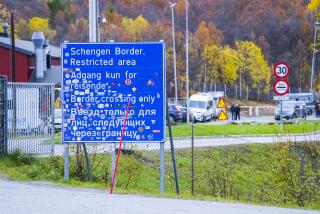For a more secure Iraq, wall off Syria
- Share via
PRESIDENT BUSH’S “National Strategy for Victory in Iraq” focuses on the need to stop foreign fighters from coming into Iraq through neighboring countries, especially Syria. However, current U.S. policies have not halted this flow of insurgents, weapons and money. Unless the United States and its Iraqi allies can seal the border with Syria, enduring peace will not come to Iraq.
The porous border is troublesome because many of the suicide bombers who have taken such a toll in American and Iraqi blood are foreigners -- from Saudi Arabia, Syria, Egypt and elsewhere in the Middle East and Europe. Those infiltrators who do not kill themselves in terrorist attacks are often skilled in military tactics or bomb making. Such insurgents act as “force multipliers” -- meaning a few can cause much damage.
This means that even “winning the hearts and minds” of Iraqis will not end the campaign of suicide terror and assassinations carried out by foreign fanatics. Such violence fuels dangerous sectarian tensions between Iraq’s ethnic communities and provides foreigners with combat experience that makes them even more dangerous in the future.
The 375-mile Iraqi-Syrian border mixes flat deserts with river valleys, and it is riddled with smuggling routes and cross-border tribal connections that foreign insurgents can take advantage of to slip into the country.
The United States has tried two policies to deal with this problem. First, it has pressured the Syrian government to crack down on its side of the border. However, Syria has shown few signs that it is intimidated by the United States, largely because the U.S. military would be stretched to, or beyond, its limits by an invasion.
The second policy has been a series of military campaigns to clear out insurgents from towns near the border. While these operations can temporarily tamp down insurgent activity, they are unlikely to keep the peace as long as willing jihadists are still able to move in and out of the country. Playing hide-and-seek with insurgents in western Iraq is a costly and reactive endeavor that cannot permanently stem the tide of infiltrators.
Instead of relying on either Syrian cooperation or sporadic offensives in Al Anbar province, American and Iraqi forces need to establish real control along the border. This solution seems obvious, but it is often overlooked in favor of more dramatic policies, such as military invasions and coercive diplomacy. However, France, India, Israel, Morocco and Turkey have all successfully used border defenses to neutralize transnational insurgents.
France’s effort in Algeria is the most remarkable example of success. French forces built a fence along the Algerian border with Tunisia in 1957, reducing infiltration of Algerian rebel forces by 90%.
The Indians are pursuing this policy in Kashmir, the Israelis rely heavily on barriers along their borders to stop terrorists, and Morocco blocks Polisario guerrillas in Western Sahara with a 1,600-mile wall. Turkey has used similar strategies on its borders with Syria and Iraq while fighting the Kurdish PKK. Kuwait is now building a fence along its border with Iraq to block violent spillover from the insurgency.
The Iraqi border with Syria is a good candidate for a barrier. The terrain allows for easier patrol and surveillance than in Kashmir, and, unlike Israel, the border is internationally recognized as legitimate.
Sealing the entire border with a wall patrolled by troops would be ideal, but even just fencing off the most commonly used areas of infiltration, including along the Tigris-Euphrates river basin, would help.
Iraqi troops could perform basic tasks such as patrolling and maintenance, while the American military handled high-tech surveillance and pursued infiltrators. Well-guarded border crossings would allow international commerce to continue while also providing an opportunity to keep track of who is entering and exiting the country.
Sealing the Iraqi border would certainly be costly. But the expense in both blood and treasure is negligible compared to the alternatives.
Control of the border is the best way to blunt the influx of radical jihadists battling American forces, while also stemming the dangerous outflow of insurgents into the rest of the Middle East. Stability and peace in both Iraq and the region can only be achieved if the country is isolated from the broader currents of violent Islamist extremism that are currently flowing across its borders.
More to Read
Sign up for Essential California
The most important California stories and recommendations in your inbox every morning.
You may occasionally receive promotional content from the Los Angeles Times.










